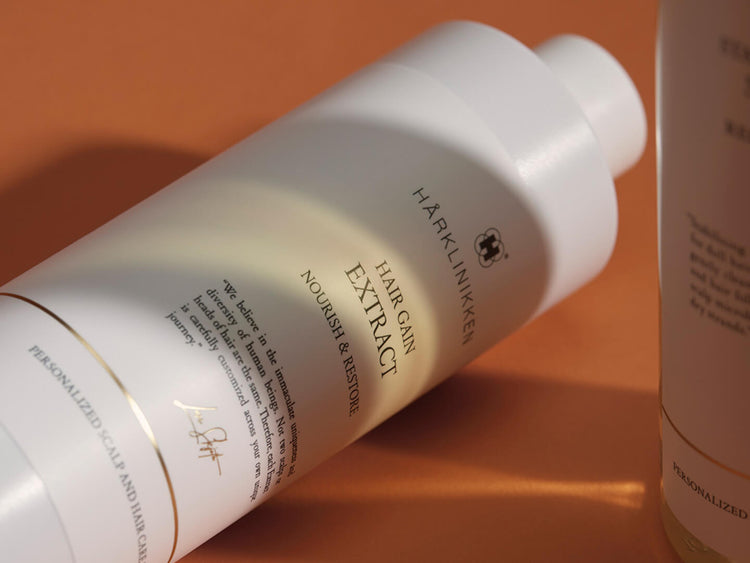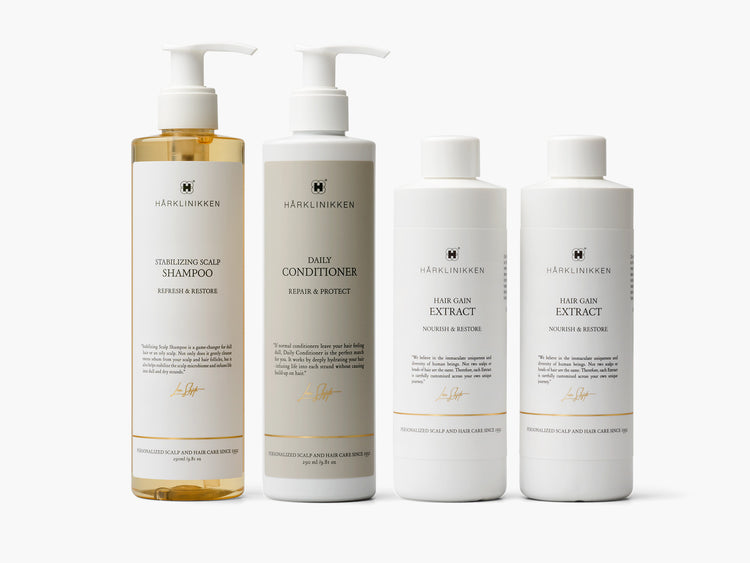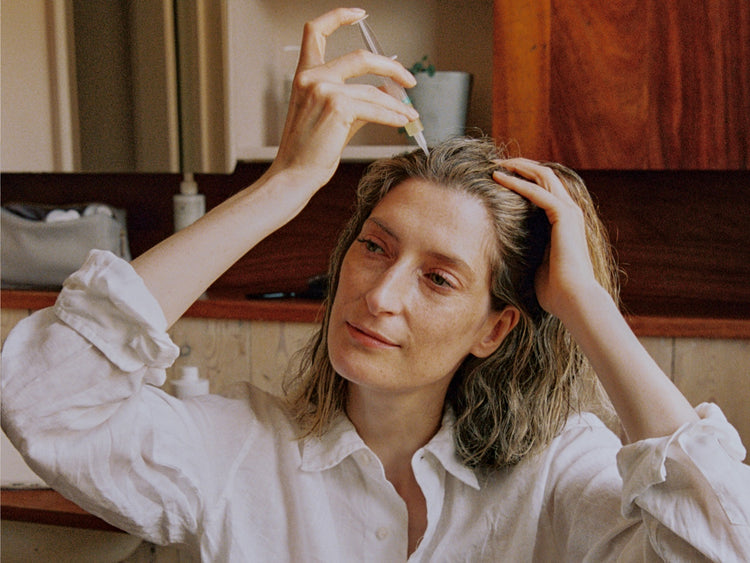Menopause and perimenopause (the phase leading up to menopause) present many changes and affect people in different ways. The entire menopausal transition lasts an average of two to four years – a significant amount of time considering all the shifts occurring, affecting everything from your metabolism to mood, sleep, scalp and hair.
Around half of menopausal individuals experience hair loss and texture changes, but it’s often treatable. Ultimately, being mindful of your scalp health will lead to more, and better quality, hair.
How does menopause affect hair?
During menopause, around 50% of individuals experience hair loss and thinning as well as increasingly dry, brittle strands. Fluctuating hormones, aging scalp skin, and the body’s production of fewer natural oils are the main causes. Decreasing levels of oestrogen – a hormone that keeps hair in the anagen (growing phase) for longer – can lead to an increase in androgens that shrink or inhibit hair follicles, resulting in miniaturisation and ultimately hair loss and thinning.
Does perimenopause affect hair the same way?
Many symptoms of menopause actually begin during perimenopause, which typically occurs in your mid-40s, but can start earlier. Similar to menopause, oestrogen and progesterone levels decrease during perimenopause, making follicle miniaturisation, hair thinning and loss more likely.
How does menopause affect the scalp?
General aging of the scalp and irregularities in hormones like oestrogen, progesterone and testosterone can also mean imbalances in pH levels and sebum production. Sebum – the natural oil that keeps our skin moisturised – needs to stay at an optimal level for a healthy scalp and hair. Too much sebum can lead to oily buildup; too little sebum can lead to dryness; and both can result in an itchy, flaking, irritated scalp.
Which foods and vitamins help menopausal hair changes?
Consuming plenty of vitamins, minerals and nutrients is important for overall health at all ages, but especially as we get older. Oxidative stress can reduce healthy cell renewal on the scalp and collagen production as well as increasing the risk of psoriasis, dermatitis and dandruff. A diet that’s rich in vitamins B; C; and D, omega-3s, collagen and zinc will support general wellbeing and, in turn, a healthier scalp.
Foods that are rich in those vitamins and minerals include:
- Berries (especially cranberries, blueberries, goji berries)
- Leafy greens like kale and spinach
- Red cabbage
- Artichokes
- Bone broth
- Chicken
- Nuts (especially cashews, almonds and walnuts)
- Dark chocolate
Which products help with menopausal hair changes?
In general, cleansing your scalp thoroughly and frequently with a gentle but effective shampoo will reduce buildup and inflammation, supporting the follicles to grow healthier, stronger hair. For those with dry, brittle or wiry strands, using leave-in conditioner and applying a hair mask (once a week) will provide nourishment, leaving hair feeling softer and silkier. Scalp products like Hårklinikken Hair Gain Extract will boost your scalp’s health and promote thicker, more lustrous hair.
What are some other ways to best care for my hair and scalp?
Some scalp and hair health rules are universal – no matter your age or gender:
- Avoid brushing your hair while it’s wet and never vigorously rub your scalp to dry it.
- Hair is most vulnerable when it’s wet, so it needs to be treated with care.
- Try to use styling tools like hairdryers, straighteners and curling wands infrequently and on low heat to avoid drying and damaging out your strands – and always prep hair with a heat protectant first.
- Minimise the use of potentially damaging products and processes like harsh dyes, relaxers, perms, dry shampoos and alcohol-based styling sprays.
- Massage your scalp daily to increase circulation and stimulate hair growth, but be sure to massage – don’t rub – those hair follicles.
Can you reverse menopausal hair thinning?
In many cases, perimenopausal and menopausal hair loss can be treated – it just takes commitment. There are various products and practices that can be applied during and after menopause to maintain a healthy scalp, avoid hair loss, and encourage hair gain. If you’re experiencing hair thinning or excessive shedding, book a consultation with one of our Hair Specialists who will determine if you’re a candidate for The Hårklinikken Method.

Unsure where to start?
We only accept candidates who we believe we can help, which is why our online Hair Assessment is the best place to start. Based on your results, you will either qualify for immediate treatment or we will organize a consultation.





